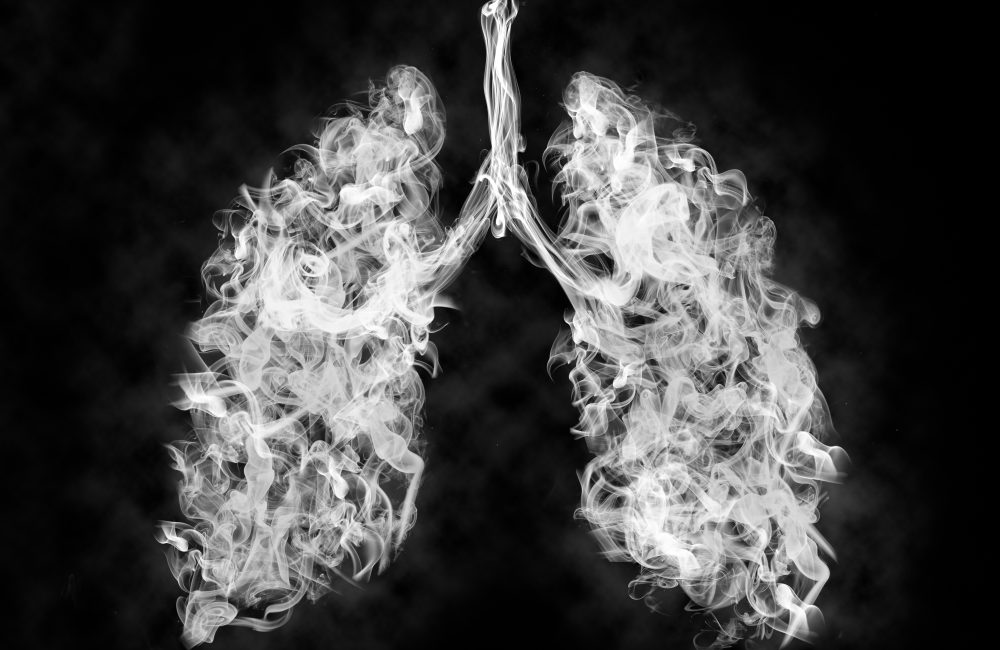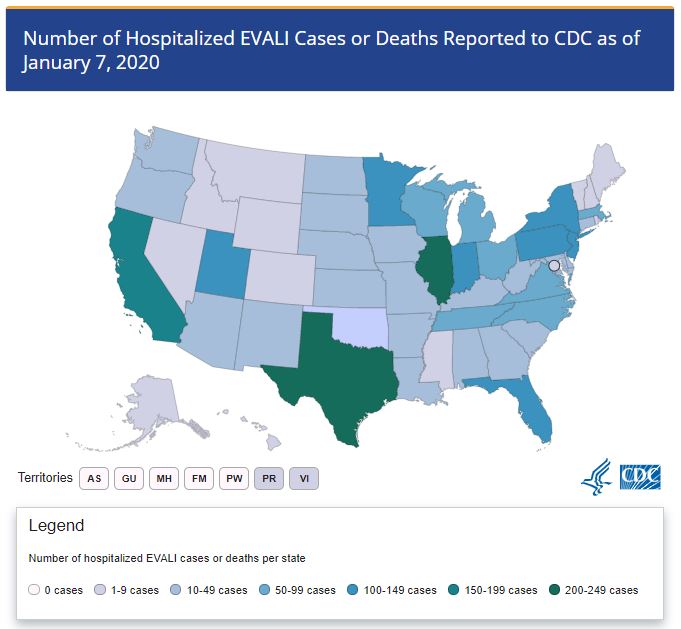The investigation into the ongoing lung injury outbreak continues, with the focus remaining on e-cigarette use as the culprit. The Centers for Disease Control and Prevention (CDC), U.S. Food and Drug Administration (FDA) and various local and state health departments are joining forces to continue the investigation. The lung injury is now being called EVALI, or e-cigarette or vaping associated lung injury.
Lung Injury Outbreak Information
The outbreak of lung injuries associated with e-cigarette use spans almost every state.
The CDC reports the following updates on how the outbreak is affecting Americans:
- 2,602 hospitalizations due to EVALI.
- 57 deaths are confirmed across 27 states and the District of Columbia.
- Reports include all 50 states, the District of Columbia, Puerto Rico and the U.S. Virgin Islands.
- 67 percent of patients with EVALI are male.
- 37 percent of patients are 18-24 years old.
- 82 percent of patients with EVALI report using products containing THC.
- 34 percent of patients report exclusively using THC-containing products.
- 78 percent of patients report acquiring THC products from informal sources (friends, family, dealers or online).
While these numbers are alarming, the CDC notes that there are likely many more cases of EVALI. There may also be more deaths as time goes on.
Why Are E-Cigarettes Making People Sick?
Investigators are studying several different substances related to e-cigarette and vaping products. They are working to determine if any substances or chemicals in these products are what is causing so many people to become sick. The CDC also notes that there is the possibility that EVALI is the result of more than one cause.
One of the common factors that investigators have found is the presence of vitamin E acetate in samples. Vitamin E acetate has been found in e-cigarette produces. It has also been found in lung samples of people who have EVALI.
Vitamin E acetate is found in many common foods including vegetables, meat, cereal, fruits and oils. It is also a dietary supplement and an additive to many cosmetic products. It is used as an additive in e-cigarettes, primarily those containing THC. Vitamin E acetate is generally not harmful to ingest, however, research suggests it can be harmful to the lungs if inhaled.
What are Investigators Doing about the Lung Injury Outbreak?
The CDC, FDA, local and state agencies are working together to pinpoint the cause of the lung injury outbreak. Also, they want to establish better methods of detection and treatment options. According to the CDC, the primary goals of the ongoing investigation are to:
- Identify the risk factors for EVALI
- Determine the source of EVALI
- Detect and track cases (probable and confirmed) throughout the U.S.
- Communicate actionable recommendations to clinical, local and state agencies.
- Establish laboratory procedures that assist the investigation and patient care.
To meet these goals, the CDC has activated an Emergency Operations Center (EOC) – a location allowing coordination of activities as well as providing assistance to local partners. The CDC also deployed Epidemic Intelligence Service (EIS) officers to provide state-level support.
As part of the detection and treatment process, the CDC has established new laboratory testing measures, including:
- Testing bronchoalveolar lavage (BAL) fluid samples.
- Testing blood and urine samples and comparing to the BAL fluid samples.
- Conducting pathologic studies on lung biopsy or autopsy specimens.
- Offering aerosol emissions testing for samples of e-cigarette and vaping products. These samples are then compared to BAL fluid samples.
- Reviewing results to gain insight into the chemical nature of e-cigarettes and the outbreak.
- Providing guidance documents to public laboratories, pathologists and healthcare providers. The documents offer guidance on specimen collection and storage, as well as how to send samples to the CDC.
What are the Symptoms of EVALI?
While symptoms of lung illness may vary from one person to the next, the CDC notes that there are many symptoms that are consistent among patients suffering from the lung injury outbreak. These symptoms include:
- Respiratory – Symptoms include cough, shortness of breath and chest pain.
- Gastrointestinal – Symptoms include abdominal pain, nausea, vomiting and diarrhea.
- Constitutional – Symptoms include chills, fever and weight loss
Some patients report developing symptoms relatively quickly after using an e-cigarette product. Others report symptoms developing over the course of several weeks. In either case, if you use e-cigarettes and experience any of these symptoms, you should contact your healthcare provider right away.
Patients who have a EVALI diagnosis can file a report with the CDC or FDA. The CDC has an online contact form, or you can call them at 1-800-CDC-INFO. The FDA also offers the Safety Reporting Portal, where you can submit a report online.
CDC and FDA Safety Recommendations
The CDC and FDA both are urging consumers to be aware of the dangers of e-cigarettes and vaping. They offer the following safety recommendations:
- Do not use e-cigarette or vaping products from informal sources.
- Do not use any inhaled product that contains vitamin E acetate.
- If you are using e-cigarettes as an alternative to smoking tobacco cigarettes, talk to your doctor about the risks and alternatives.
- Carefully monitor yourself and family members who use e-cigarettes. Anyone with symptoms of EVALI should get medical attention to test for the lung illness.
- Beware of products like JUUL that have been recalled or removed from stores because of safety concerns.
- If you currently smoke and want to stop, talk to your doctor about FDA-approved smoking cessation therapies.
- If you believe you have EVALI related to e-cigarettes, you can contact the poison control center at 1-800-222-1222.
- Be careful when using any products containing THC. The CDC does not know how different products may impact EVALI and lung illnesses.
- Parents should beware of vaping related illness. Children and youth certainly should not use e-cigarettes or vape products.
Ultimately, the CDC warns that there are no safe tobacco products. Whether traditional cigarettes, e-cigarettes, vapes or hookahs, any tobacco product has risks.
Sources:
- https://www.fda.gov/news-events/public-health-focus/lung-illnesses-associated-use-vaping-products
- https://www.cdc.gov/tobacco/basic_information/e-cigarettes/severe-lung-disease.html
- https://www.safetyreporting.hhs.gov/SRP2/en/Home.aspx?sid=1c42de59-d07d-4f08-a3d3-8af69b17
- https://wwwn.cdc.gov/dcs/ContactUs/Form

